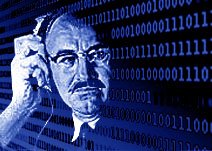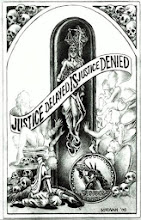
Unnamed "Privacy Groups" Challenge FCC Wiretapping Rules
The new FCC rules are being attacked on several fronts. Dispite the fact that the country's very best civil rights attorneys have been working on them for years, several "privacy and civil liberties groups" are challenging the rules on the grounds that they have the potential to be "Big Brother" type wiretaps, in which law-enforcement officials could do any type of surveillance they wanted.
New Federal Communications Commission rules that expand the wiretapping capability of law enforcement are under fire by privacy , high-tech, and telecommunications groups.
In an effort to make it easier for law enforcement to monitor e-mails and VoIP calls, the FCC is attempting to extend the reach of a 1994 law, the Communications Assistance for Law Enforcement Act.
Originally passed to simplify investigations that involved telecom companies and alleged Internet criminals, the FCC now wants to require Internet providers and VoIP companies to fall under the law's directives. The new rules are scheduled to be put in place in May 2007.
Hue and Cry
The new FCC rules are being attacked on several fronts. Privacy and civil liberties groups are challenging the rules on the grounds that they have the potential to be "Big Brother" type wiretaps, in which law-enforcement officials could do any type of surveillance they wanted.
Some are challenging the FCC on economic grounds, saying that the rules would force universities and libraries, as well as smaller ISPs, to pay dearly for network redesigns to make them accessible to law enforcement.
Also mentioned in the challenges is the belief that Internet innovation could be stifled because the technological demands of developers would hinder their works in progress.
Balance Beam
As electronic communication becomes more prevalent on a global scale, governments are seeking ways to use the technology to catch Internet criminals and terrorists. But such actions are forcing privacy watchdogs to be even more vigilant, said Marc Rotenberg, executive director of the Electronic Privacy Information Center.
"We understand that governments need to prosecute cybercrime and to track terrorists," he said. "But there has to be a balance with protection of privacy and civil liberties."
In many items of proposed legislation, Rotenberg has seen only a nod toward privacy protection and a strong emphasis on giving law enforcement agencies more power.
"The big concern is how much authority we're giving to this small group of people," said Rotenberg. "We need to catch terrorists and cybercriminals, but there's a way to do that without stripping away individual protections."
Observations
It's the experience of this author that these "privacy groups" are well-funded, extreme leftist organizations, who have become very well organized toward depriving America of many freedoms, while using "Freedom" as a catalyst for their crusades. The best example is the most recent introduction of a bill before Congress that makes the sale of a social security number a crime.
Under the guise of "protection against the epidemic of identity theft," these groups seek to eliminate the credit bureaus and data compilation companies from selling peoples' social security numbers, which are generally used to determine identity between one "John Doe" and another.
For example, if you had an auto accident, while on vacation in another state, and wanted to sue the driver, a Mrs. Tom Schmidt, who once lived at 8888 Eightball Avenue, in Los Angeles, California, but you had no zip code, (usually because either the cop didn't record it, or his form didn't require it), and your attorney just spent a few of your dollars, learning that Eightball Avenue just became the cross-town Expressway, . . . you may have an issue finding the right person to have served with the legal papers to get the right Mrs. Tom Schmidt into the courtroom to answer the lawsuit.
Another example would be the case where you learn that you were adopted, and the hospital committed numerous egregious acts to cover your mother's illigitimate birth, back in the days when the FCC handled ONLY radio and television issues. Let's say, for example that you're a female, and you have a serious issue with your hormones creating a chemical imballance in your blood, and you need a family medical history, in order for your doctor to properly diagnose and treat the condition. Not possible according to these "privacy groups." You just have to fall through the cracks -- you're on your own! Leaving no possible way to force the courts to require the current authorities to allow the searches necessary to learn the truth to get the treatment for your continued survival. You are, as they say, "S.O.L." Nice approach, . . . until YOU become the victim who needs to identify someone, in order to learn the truth, or to obtain justice.
The proposals above, with the quotes from the folks in the "privacy groups," don't allow for any exception or exemptions from their feigned quest to "protect you from your government." These people simply say things like, ""We need to catch terrorists and cybercriminals, but there's a way to do that without stripping away individual protections."
But, . . . if they were truly concerned they'd listen to a few of the anecdotal stories they claim to eschew, because they complicate their objectives, and make exceptions for the various freedoms enjoyed by Americans, in so many ways.
They'd also be working to better protect those same citizens, through campaigns to enforce the laws currently in effect, that require adequate prosection of the criminals who commit the crimes of "identity theft," instead of becomming fodder for the politicians who need them for very liberal publicity purposes, instead of conservative traditional ideals.
Don't think for a moment that these issues don't apply to you. You may find that there is one small condition that you aren't even aware of, that will defeat any effort you might develop, where YOU need to know the truth about someone, and a social security number, a phone number, or some other 'personal identifier' will become your saving grace. It may not be an issue today, . . . but this will effect you, or a family member in days, weeks, or even years to come. Don't let these "privacy groups" determine your personal freedom, under the guise of protecting you from your government. You ARE the government. And, you control it at the polls, and by calling or writing those legislative representatives you elect.
Protecting yourself from the evils of terrorism should always be at the forefront of your mind, as you keep up with current laws effecting the protection of you, your family, and your neighbors. There's nothing wrong with questioning the methods used by the government, but don't fall for these "privacy groups" publicity campaigns. They want to take your freedom, and expand their version of the government they claim to oppose.
God Bless,
Dan'L


0 Comments:
Post a Comment
<< Home